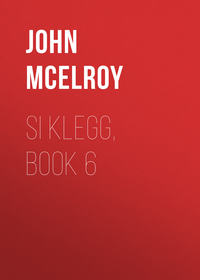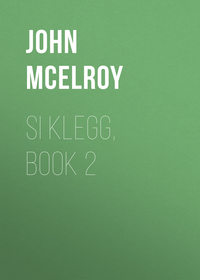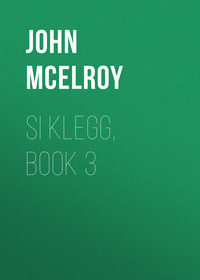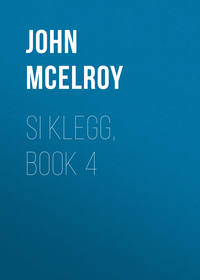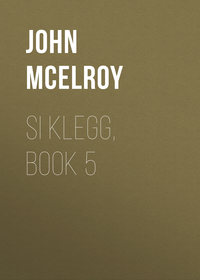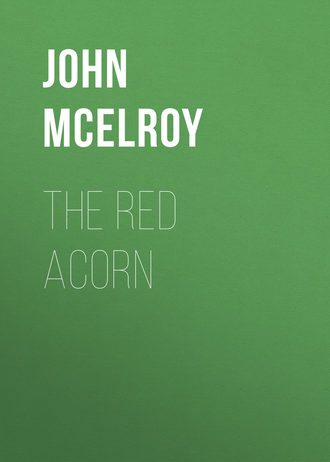 полная версия
полная версияThe Red Acorn
The men threw themselves down for a moment’s rest, on the springing moss that covered the whole mountain side. A hum of comment and conversation arose. Jake Alspaugh began to think that there was not likely to be any fight after all, and his spirits rose proportionately. Abe Bolton growled that the cowardly officers had no doubt deliberately misled the regiment, that a fight might be avoided. Kent Edwards saw a nodding May-apple flower—as fair as a calla and as odorous as a pink—at a little distance, and hastened to pick it. He came back with it in the muzzle of his gun, and his hands full of violets.
A thick-bodied rattlesnake crawled slowly and clumsily out from the shelter of a little ledge, his fearful eyes gleaming with deadly intentions against a ground-squirrel frisking upon the end of a mossy log, near where Captain Bob Bennett was seated, poring over a troublesome detail in the “Tactics.” The snake saw the man, and his awkward movement changed at once into one of electric alertness. He sounded his terrible rattle, and his dull diamonds and stripes lighted up with the glare that shines through an enraged man’s face. The thick body seemed to lengthen out and gain a world of sinuous suppleness. With the quickness of a flash he was coiled, with head erect, forked tongue protruding, and eyes flaming like satanic jewels.
A shout appraised Captain Bennett of his danger. He dropped the book, sprang to his feet with a quickness that matched the snake’s, and instinctively drew his sword. Stepping a little to one side as the reptile launched itself at him, he dexterously cut it in two with a sweeping stroke. A shout of applause rose from the excited boys, who gathered around to inspect the slain serpent and congratulate the Captain upon his skillful disposition of his assailant.
“O, that’s only my old bat-stroke that used to worry the boys in town-hall so much,” said the Captain carelessly. “It’s queer what things turn out useful to a man, and when he least expects them.”
A long, ringing yell from a thousand throats cleft the air, and with its last notes came the rattle of musketry from the brow of the hill across the little ravine. The bullets sang viciously overhead. They cut the leaves and branches with sharp little crashes, and struck men’s bodies with a peculiar slap. A score of men in the disordered group fell back dead or dying upon the green moss.
“Of course, we might’ve knowed them muddle-headed officers ‘d run us right slap into a hornets’ nest of Rebels before they knowed a thing about it,” grumbled Abe Bolton, hastily tearing a cartridge with his teeth, and forcing it into his gun.
“Hold on, my weak-kneed patriot,” said Kent Edwards, catching Jake Alspaugh by the collar, and turning him around so that he faced the enemy again. “It’s awful bad manners to rush out of a matinee just as the performance begins. You disturb the people who’ve come to enjoy the show. Keep you seat till the curatin goes down. You’ll find enough to interest you.”
The same sudden inspiration of common-sense that had flashed upon Captain Bennett, in encountering the snake now raised him to the level of this emergency. He comprehended that the volley they had received had emptied every Rebel gun. The distance was so short that the enemy could be reached before they had time to re-load. But no time must be lost in attempting to form, or in having the order regularly given by the Colonel. He sprang toward the enemy, waving his sword, and shouted in tones that echoed back from the cliffs:
“Attention, BATTALION! Charge bayonets! FORWARD, DOUBLE-QUICK, MARCH!”
A swelling cheer answered him. His own company ran forward to follow his impetuous lead. The others joined in rapidly. Away they dashed down the side of the declivity, and in an instant more were swarming up the opposite side toward the astonished Rebels. Among these divided councils reigned. Some were excited snapping unloaded guns at the oncoming foe; others were fixing bayonets, and sturdily urging their comrades to do likewise, and meet the rushing wave of cold steel with a counter wave. The weaker-hearted ones were already clambering up the mountain-side out of reach of harm.
There was no time for debate. The blue line led by Bennett flung itself upon the dark-brown mass of Rebels like an angry wave dashing over a flimsy bank of sand, and in an instant there was nothing to be done but pursue the disrupted and flying fragments. It was all over.
Chapter III. A Race
“Some have greatness thrust upon them.”– Twelfth Night.The unexpected volley probably disturbed private Jacob Alspaugh’s mind more than that of any other man in the regiment. It produced there an effect akin to the sensation of nauseous emetic in his stomach.
He had long enjoyed the enviable distinction of being the “best man” among combative youths of Sardis, and his zeal and invariable success in the fistic tournaments which form so large a part of the interest in life of a certain class of young men in villages, had led his townsmen to entertain extravagant hopes as to his achievements in the field.
But, like most of his class, his courage was purely physical, and a low order of that type. He was bold in those encounters where he knew that his superior strength and agility rendered small the chances of his receiving any serious bodily harm, but of that high pride and mounting spirit which lead to soldierly deeds he had none.
The sight of the dying men on each side shriveled his heart with a deadly panic.
“O, Kent,” he groaned, “Lemme go, and let’s git out o’ here. This’s just awful, and it’ll be ten times wuss in another minnit. Let’s git behind that big rock there, as quick as the Lord’ll let us.”
He turned to pull away from Kent’s detaining hand, when he heard Captain Bennett’s order to the regiment to charge, and the hand relaxed its hold. Jake faced to the front again and saw Kent and Abe Bolton, and the rest of the boys rush forward, leaving him and a score of other weak-kneed irresolutes standing alone behind.
Again he thought he would seek the refuge of the rock, but at that moment the Union line swept up to the Rebels, scattering them as a wave does dry sand.
Jake’s mental motions were reasonably rapid. Now he was not long in realizing that all the danger was past, and that he had an opportunity of gaining credit cheaply. He acted promptly. Fixing his bayonet, he gave a fearful yell and started forward on a run for the position which the regiment had gained.
He was soon in the lead of the pursuers, and appeared, by his later zeal, to be making amends for his earlier tardiness. As he ran ahead he shouted savagely:
“Run down the hellions! Shoot ‘em! Stab ‘em! Bay’net ‘em! Don’t let one of ‘em git away.”
There is an excitement in a man-chase that is not even approached by any other kind of hunting, and Jake soon became fairly intoxicated with it.
He quickly overtook one or two of the slower-paced Rebels, who surrendered quietly, and were handed by him over to the other boys as they came up, and conducted by them to the rear.
Becoming more excited he sped on, entirely unmindful of how far he was outstripping his comrades.
A hundred yards ahead of him was a tall, gaunt Virginian, clad in butternut-colored jeans of queer cut and pattern, and a great bell-crowned hat of rough, gray beaver. Though his gait was shambling and his huge splay feet rose and fell in the most awkward way, he went over the ground with a swiftness that made it rather doubtful whether Jake was gaining on him at all. But the latter was encouraged by the sings of his chase’s distress. First the bell-crowned hat flew off and rolled behind, and Jake could not resist the temptation to give it a kick which sent it spinning into a clump of honeysuckles. Then the Rebel flung off a haversack, whose flapping interfered with his speed, and this was followed by a clumsily-constructed cedar canteen. The thought flashed into Jake’s mind that this was probably filled with the much-vaunted peach-brandy of that section; and as ardent sprits were one of his weaknesses, the temptation to stop and pick up the canteen was very strong, but he conquered it and hurried on after his prey. Next followed the fugitive’s belt, loaded down with an antique cartridge-box, a savage knife made from a rasp and handled with buckhorn, and a fierce-looking horse-pistol with a flint-lock.
“I seemed to be bustin’ up a moosyum o’ revolutionary relics,” said Jake afterward, in describing the incident. “The feller dropped keepsakes from his forefathers like a bird moltin’ its feathers on a windy day. I begun to think that if I kep up the chase purty soon he’d begin to shed Continental money and knee-britches.”
The fugitive turned off to the right into a narrow path that wound through the laurel thickets. Jake followed with all the energy that remained in him, confident that a short distance more would bring him so close to his game that he could force his surrender by a threat of bayoneting. He caught up to within a rod of the Rebel, and was already foreshortening his gun for a lunge in case of refusal to surrender on demand, when he was amazed to see the Rebel whirl around, level his gun at him, and order HIS surrender. Jake was so astonished that he stumbled, fell forward and dropped his gun. As he raised his eyes he saw three or four other Rebels step out from behind a rock, and level their guns upon him with an expression of bloodthirstiness that seemed simply fiendish.
Then it flashed upon him how far away he was from all his comrades, and that the labyrinth of laurel made them even more remote. With this realization came the involuntary groan:
“O, Lordy! it’s all up with me. I’m a goner, sure!”
His courage did not ooze out of his fingers, like the historic Bob Acres’s; it vanished like gas from a rent balloon. He clasped his hands and tried to think of some prayer.
“Now I lay me,” he murmured.
“Shan’t we shoot the varmint?” said one of the Rebels, with a motion of his gun in harmony with that idea.
“O, mister—mister—GOOD mister, DON’T! PLEASE don’t! I swear I didn’t mean to do no harm to you.”
“Wall, ye acted monty quare fur a man that didn’t mean no harm,” said the pursued man, regaining his breath with some difficulty. “A-chasin’ me down with thet ar prod on yer gun, an’ a-threatenin’ to stick hit inter me at every jump. Only wanted ter see me run, did yer?”
“O, mister, I only done it because I wuz ordered to. I couldn’t help myself; I swear I couldn’t.”
“Whar’s the ossifers thet wuz a-orderin’ ye? Whar’s the captins that wuz puttin’ ye up ter hit? Thar wan’t no one in a mile of ye. Guess we’d better shoot ye.”
Again Jake raised his voice in abject appeal for mercy. There was nothing he was not willing to promise if only his life were only spared.
“Wouldn’t hit be better ter bay’net him?” suggested one of the Rebels, entirely unmoved, as his comrades were, by Jake’s piteous pleadings. “Ef we go ter shootin’ ‘round yere hit’ll liekly bring the Yankees right onter us.”
“I ‘spect hit would be better ter take him back a little ways, any way,” said the man whom Jake had pursued. “Pick up his gun thar, Eph. Come along, you, an’ be monty peart about hit, fur we’re in a powerful bad frame o’ mind ter be fooled with. I wouldn’t gin a fi’-penny-bit fur all yer blue-bellied life’s worth. The boys ar jest pizen mad from seein’ so many o’ thar kin and folks killed by yer crowd o’ thievin’ Hessians.”
Grateful for even a momentary respite, Jake rose from his knees with alacrity and humbly followed one of the Rebels along the path. The others strode behind, and occasionally spurred him into a more rapid pace with a prick from their bayonets.
“O,–ough, mister, don’t do that! Don’t, PLEASE! You don’t know how it hurts. I ain’t got no rhinoceros skin to stand such jabs as that. That came purty nigh goin’ clean through to my heart.”
“Skeet ahead faster, then, or the next punch’ll go righ smack through ye, fur sartin. Ef yer skin’s so tender what are ye doin’ in the army?”
They climbed the mountain laboriously, and started down on the other side. About midway in the descent they came upon a deserted cabin standing near the side of the road.
“By the Lord Harry,” said one of the Rebels, “I’m a’most done clean gin out, so I am. I’m tireder nor a claybank hoss arter a hard day’s plowin’, an’ I’m ez dry ez a lime-kiln. I motion that we stop yere an’ take a rest. We kin put our Yank in the house thar, an’ keep him. I wonder whar the spring is that the folks thet lived yere got thar water from?”
“Ef I don’t disremember,” said another, “this is the house where little Pete Higgenbottom lived afore the country got ruther onhelthy fur him on account of his partiality for other people’s hosses. I made a little trip up yere the time I loss thet little white-faced bay mar of pap’s, an I’m purty sure the spring’s over thar in the holler.”
“Lordy, how they must ‘ve hankered arter the fun o’ totin’ water to ‘ve lugged hit clar from over tha. I’d’ve moved the house nigher the spring afore I’d’ve stood thet ere a month, so I would.”
“The distance to the water ortent to bother a feller thet gets along with usin’ ez little ez you do,” growled the first speaker.
“A man whose nose looks like a red-pepper pod in August, and his shirt like a section o’ rich bottom land, hain’t no great reason ter make remarks on other folks’s use o’ water.”
Jake plucked up some courage from the relaxation in the savage grimness of his captors, which seemed implied by this rough pleasantry, and with him such recuperation of spirits naturally took the form of brassy self-assertion.
“Don’t you fellers know,” he began with a manner and tone intended to be placating, but instead was rasping and irritating, “don’t you fellers know that the best thing you can do with me is to take me back to our people, and trade me off for one of your fellers that they’ve ketched?”
“An’ don’t ye know thet the best thing ye kin do is to keep thet gapin’ mouth o’ your’n shet, so thet the flies won’t git no chance to blow yer throat?” said the man whose nose had been aptly likened to a ripe red-pepper pod, “an’ the next best thing’s fur ye to git inter that cabin thar quicker’n blazes ‘ll scorch a feather, an’ stay thar without makin’ a motion toward gittin’ away. Git!” and he made a bayonet thrust at Jake that tore open his blouse and shirt, and laid a great gaping wound along his breast. Jake leaped into the cabin and threw himself down upon the puncheon floor.
“Thar war none of our crowd taken,” said another of the squad, who had looked on approvingly. “They wuz all killed, an’ the only way to git even is ter send ye whar they are.”
Jake made another earnest effort to recall one of the prayers he had derided in his bad boyhood.
Leaving the red-nosed man to guard the prisoner, the rest of the Rebels started for the hollow, in search of water to cool their burning thirst.
They had gained such a distance from the scene of the fight, and were in such an out-of-the-way place, that the thought of being overtaken did not obtrude itself for an instant, either upon their minds or Jake’s.
But as they came back up the hill, with a gourd full of spring water for their companion, they were amazed to see a party of blue-coats appear around the bend of the road at a little distance. They dropped the gourd of water, and yelled to the man on guard:
“Kill the Yank, an’ run for yer life!” and disappeared themselves, in the direction of the spring.
The guard comprehended the situation and the order. He fired his gun at Jake, but with such nervous haste as to destroy the aim, and send the charge into the puncheon a foot beyond his intended victim, and then ran off with all speed to join his companions. The Union boys sent a few dropping shots after him, all of which missed their mark.
Jake managed to recover his nerves and wits sufficiently to stagger to the door as his comrades came up, and grasp one of the guns the Rebels had left.
Questions and congratulations were showered upon him, but he replied incoherently, and gasped a request for water, as if he were perishing from thirst. While some hunted for this, others sought for traces of the Rebels; so he gained time to fix up a fairly presentable story of a desperate and long-continued bayonet struggle in which he was behaving with the greatest gallantry, although nearly hopeless of success, when the arrival of help changed the aspect of matters. He had so many gaping wounds to confirm the truth of this story, that it was implicitly believed, and he was taken back to camp as on e of the foremost heroes of that eventful day. The Colonel made him a Sergeant as soon as he heard the tale, and regretted much that he could not imitate the example of the great Napoleon, and raise him to a commission, on the scene of his valiant exploits. His cot at the hospital was daily visited by numbers of admiring comrades, to whom he repeated his glowing account of the fight, with marked improvements in manner and detail accompanying every repetition.
He had no desire to leave the hospital during his term of service, but his hurts were all superficial and healed rapidly, so that in a fortnight’s time the Surgeon pronounced him fit to return to duty. He cursed inwardly tha officer’s zeal in keeping the ranks as full as possible, and went back to his company to find it preparing to go into another fight.
“Hello, Jake,” said his comrades, “awful glad to see you back. Now you’ll have a chance to get your revenge on those fellows. There’ll be enough of us with you to see that you get a fair fight.”
“To the devil with their revenge and a fair fight,” said Jake to himself. That evening he strolled around to the headquarters tent, and said to the commander of the regiment:
“Colonel, the doctor seems to think that I’m fit to return to duty, but I don’t feel all right yet. I’ve a numbness in my legs, so that I kin hardly walk sometims. It’s my old rheumatics, stirred up by sleeping out in the night air. I hear that the man who’s been drivin’ the headquarters wagin has had to go to the hospital. I want to be at something, even if I can’t do duty in the ranks, and I’d like to take his place till him and me gets well.”
“All right, Sergeant. You can have the place as long as you wish, or any other that I can give you. I can’t do too much for so brave a man.”
So it happened that in the next fight the regiment was not gratified by any thrilling episodes of sanguinary, single-handed combats, between the indomitable Jake and bloodthirsty Rebels.
He had deferred his “revenge” indefinitely.
Chapter IV. Disgrace
For of fortune’s sharp adversitie The worst kind of infortune is this: A man that hath been in prosperitie, And it remember when it passed is.– Chaucer.Harry Glen’s perfect self-complacency did not molt a feather when the victors returned to camp flushed with their triumph, which, in the eyes of those inexperienced three-months men, had the dimensions of Waterloo. He did not know that in proportion as they magnified their exploit, so was the depth of their contempt felt for those of their comrades who had declined to share the perils and the honors of the expedition with them. He was too thoroughly satisfied with himself and his motives to even imagine that any one could have just cause for complaint at anything he chose to do.
This kept him from understanding or appreciating the force of the biting innuendoes and sarcasms which were made to his very face; and he had stood so aloof from all, that there was nobody who cared to take the friendly trouble of telling him how free the camp conversation was making with his reputation.
He could not help, however, understanding that in some way he had lost caste with the regiment: but he serenely attributed this to mean-spirited jealousy of the superior advantages he was enjoying, and it only made him more anxious for the coming of the time when he could “cut the whole mob of beggars,” as Ned Burnleigh phrased it.
A few days more would end the regiment’s term of service, and he readily obtained permission to return him in advance.
The first real blow his confidence received was when he walked down the one principal street of Sardis, and was forced to a perception of the fact that there was an absence of that effusive warmth with which the Sardis people had ever before welcomed back their young townsman, of whose good looks and gentlemanliness they had always been proud. Now people looked at him in a curious way. They turned to whisper to each other, with sarcastic smiles and knowing winks, as he came into view, and they did not come forward to offer him their hands as of old. It astonished him that nobody alluded to the company or to anything that had happened to it.
Turning at length from the main street, he entered the lateral one leading to his home. As he did so, he heard one boy call out to another in that piercing treble which boys employ in making their confidential communications to one another, across a street,
“S-a-y-, did you know that Hank Glen ‘d got back? and they say he looks pale yet?”
“Has he?” the reply came in high falsetto, palpably tinged with that fine scorn of a healthy boy, for anything which does not exactly square with his young highness’s ideas. “Come back to mammy, eh? Well, it’s a pity she ever let him go away from her. Hope she’ll keep him with her now. He don’t seem to do well out of reach of her apron strings.”
The whole truth flashed upon him: Envious ones had slandered him at home, as a coward.
He walked onward in a flurry of rage. The thought that he had done anything to deserve criticism could not obtrude itself between the joints of his triple-plated armor of self-esteem.
A swelling contempt for his village critics flushed his heart.
“Spiteful, little-minded country boobies,” he said to himself with an impatient shake of his head, as if to adjust his hair, which was his usual sign of excitement, “they’ve always hated me because I was above them. They take advantage of the least opportunity to show their mean jealousy.”
After a moment’s pause: “But I don’t care. I’d a little rather have their dislike than their good-will. It’ll save me a world of trouble in being polite to a lot of curs that I despise. I’m going to leave this dull little burg anyhow, as soon as I can get away. I’m going to Cincinnati, and be with Ned Burnleigh. There is more life there in a day than here in a year. After all, there’s nobody here that I care anything for, except father and mother—and—Rachel.”
A new train of thought introduced itself at this tardy remembrance of his betrothed. His heat abated. He stopped, and leaning against a shady silver maple began anew a meditation that had occupied his mind very frequently since that memorable night under the old apple tree on the hill-top.
There had been for him but little of that spiritual exaltation which made that night the one supreme one in Rachel’s existence; when the rapture of gratified pride and love blended with the radiant moonlight and the subtle fragrance of the flowers into a sweet symphony that would well chord with the song the stars sang together in the morning.
He was denied the pleasure that comes from success, after harrowing doubts and fears. His unfailing consciousness of his own worth had left him little doubt that a favorable answer would promptly follow when he chose to propose to Rachel Bond, or to any other girl, and when this came with the anticipated readiness, he could not help in the midst of his gratification at her assent the intrusion of the disagreeable suspicion that, peradventure, he had not done the best with his personal wares that he might. Possibly there would appear in time some other girl, whom he might prefer to Rachel, and at all events there was no necessity for his committing himself when he did, for Rachel “would have kept,” as Ned Burnleigh coarsely put it, when made the recipient of Harry’s confidence.
Three months of companionship with Ned Burnleigh, and daily imbibation of that young man’s stories of his wonderful conquests among young women of peerless beauty and exalted social station confirmed this feeling, and led him to wish for at least such slackening of the betrothal tether as would permit excursions into a charmed realm like that where Ned reigned supreme.
For the thousandth time—and in each recurrence becoming a little clearer defined and more urgent—came the question:


